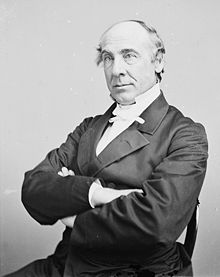Henry Whitney Bellows
Henry Whitney Bellows (born June 11, 1814 in Boston , Massachusetts , † January 30, 1882 in New York City ) was an American clergyman .
Life
Henry Whitney Bellows studied theology at Harvard College until 1832 and at Harvard Divinity School in Cambridge from 1834 to 1837 , then was briefly pastor in Mobile (Alabama) from 1837 to 1838 and then ministered to the first Congregationalists from 1839 until his death - or Unitarian Church in New York City, now the Unitarian Church of All Souls . There he gained a high reputation as a pulpit speaker and lecturer and was one of the main founders of the Unitarian weekly newspaper Christian Inquirer , for which he wrote from 1846 to 1850.
Bellows belonged to the liberal, more rationalist line of American theologians. Not only was he a distinguished public speaker and recognized leader of the United States Unitarian Church , he was also the author of numerous occasional pamphlets of various kinds (particularly political and social). He also gave a number of noteworthy lectures at the Lowell Institute in Boston, which appeared in 1857 under the title The treatment of social diseases . The most famous of these lectures dealt with The relation of the public amusements to public morality, especially of the theater to the highest interests of humanity . With his friend Peter Cooper , Bellows planned to found the Cooper Union, which opened in 1859 . In 1860 he published Restatements of Christian Doctrin, in 25 Sermons .
When the civil war broke out in 1861, Bellows made a contribution to the establishment of the United States Sanitary Commission and was this president from 1861 to 1878, without neglecting his duties as a pastor. In 1866 he went on a trip to Europe to promote the organization of international health commissions there, which he reported in the work The old World in its new Face: Impressions of Europe in 1867-68 (2 vols., New York 1868-69) . He was also president of the first Civil Service Reform Association founded in the United States (1877) and one of the organizers of the Union League Club and the Century Association in New York City. He was also the editor of the Unitarian magazine Christian Examiner and the Liberal Christian , the main body of the Unitarians. He died in New York City on January 30, 1882, at the age of 67. A collection of his sermons and addresses appeared in Boston in 1882. A bronze plaque of Augustus Saint-Gaudens was unveiled in 1886 in New York's All Souls Church.
literature
- Henry Whitney Bellows . In: Meyers Konversations-Lexikon . 4th edition. Volume 2, Verlag des Bibliographisches Institut, Leipzig / Vienna 1885–1892, pp. 672–673.
- Bellows, Henry Whitney . In Encyclopædia Britannica , 11th Edition, 1910-11, Vol. 3, p. 705.
| personal data | |
|---|---|
| SURNAME | Bellows, Henry Whitney |
| BRIEF DESCRIPTION | American clergyman |
| DATE OF BIRTH | June 11, 1814 |
| PLACE OF BIRTH | Boston , Massachusetts |
| DATE OF DEATH | January 30, 1882 |
| Place of death | New York City |
